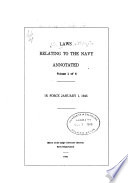 No principle of general law is more universally acknowledged than the. perfect equality of nations. Russia and Geneva have equal rights. It results from this equality, that no one can rightfully impose a rule on another. Each legislates for itself, but... No principle of general law is more universally acknowledged than the. perfect equality of nations. Russia and Geneva have equal rights. It results from this equality, that no one can rightfully impose a rule on another. Each legislates for itself, but...  Elements of International Law - Page 213by Henry Wheaton - 1866 - 749 pagesFull view Elements of International Law - Page 213by Henry Wheaton - 1866 - 749 pagesFull view - About this book
 | Carnegie Endowment for International Peace - 1925 - 278 pages
...principle of general law is more universally acknowledged than the perfect equality of nations. ... It results from this equality that no one can rightfully impose a rule upon another." j.jti At the first session of the American Institute of International Law, held in Washington... | |
 | Pan American Union - 1926 - 96 pages
...principle of general law is more universally acknowledged than the perfect equality of nations .... It results from this equality that no one can rightfully impose a rule upon another." At the first session of the American Institute of International Law, held in Washington... | |
 | Amos Shartle Hershey - 1927 - 820 pages
...rights. See also Baker, in Brit. Yr. Bk. (1923-24), 1-20; and Goebel, The Equality of Slates (1923). that no one can rightfully impose a rule on another....but its legislation can operate on itself alone." 24 Each sovereign State has also the right of selecting such arms and flags, etc., and of conferring... | |
 | Lamar Taney Beman - 1928 - 360 pages
..."No principle of general law is more universally acknowledged than the perfect equality of nations. It results from this equality that no one can rightfully impose a rule on another." 3. It is a moral violation of the Monroe Doctrine. a. When the United States commands European nations... | |
 | 1928 - 342 pages
...principle of general law is more universally acknowledged than the perfect equality of nations.... It results from this equality that no one can rightfully impose a rule upon another." At,the first session of the American Institute of International Law, held in Washington... | |
 | 1926 - 746 pages
...foreign state has no right to meddle. "No principle of general law," said Chief Justice Marshall, "is more universally acknowledged than the perfect equality of nations. Russia and Geneva have equal rights.1' Then, can one nation pass a law to bind the whole world? Can it assume to be the custos morum... | |
 | H. Lauterpacht - 1945 - 570 pages
...principle of general law is more universally acknowledged, than the perfect equality of nations. . . . It results from this equality, that no one can rightfully...but its legislation can operate on itself alone.' " In Polydore v. Prince, 19 Fed. Cas., page 950, No. n, 257, it was held as follows : " ' It is among... | |
 | United States - 1945 - 712 pages
...general In is Bore universally acknowledged, than the perfect equality of nations. Russia and Qenera hare equal rights. It results from this equality, that no one can rightfully impose a rule on another. Kach legislates for Itself, but Its legislation can operate on itself alone. A right, then, which is... | |
 | United States. Supreme Court - 1882 - 782 pages
...renounce it for its own people; but can this renunciation affect others? No principle of general law is more universally acknowledged than the perfect equality...can operate on itself alone. A right, then, which is vested in all by the consent of all, can be devested only by consent; and this trade, in which all... | |
 | Carnegie Endowment for International Peace - 1916 - 236 pages
...renounce it for its own people ; but can this renunciation affect others ? No principle of general law is more universally acknowledged, than the perfect equality...can operate on itself alone. A right, then, which is vested in all, by the consent of all, can be divested only by consent; and this [slave] trade, in... | |
| |